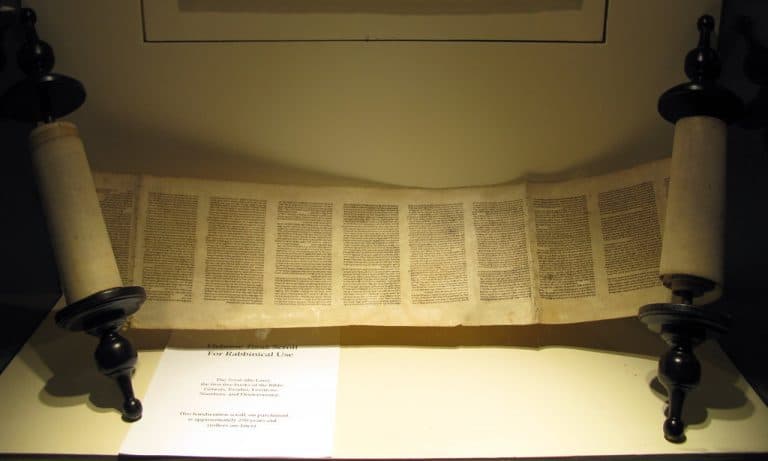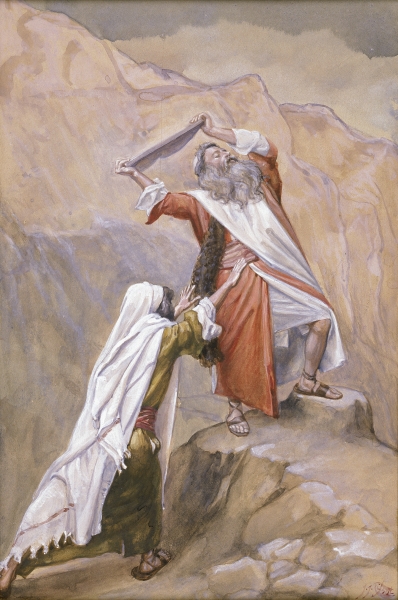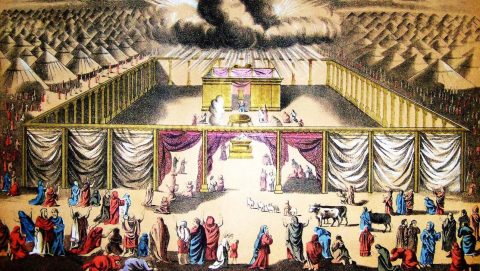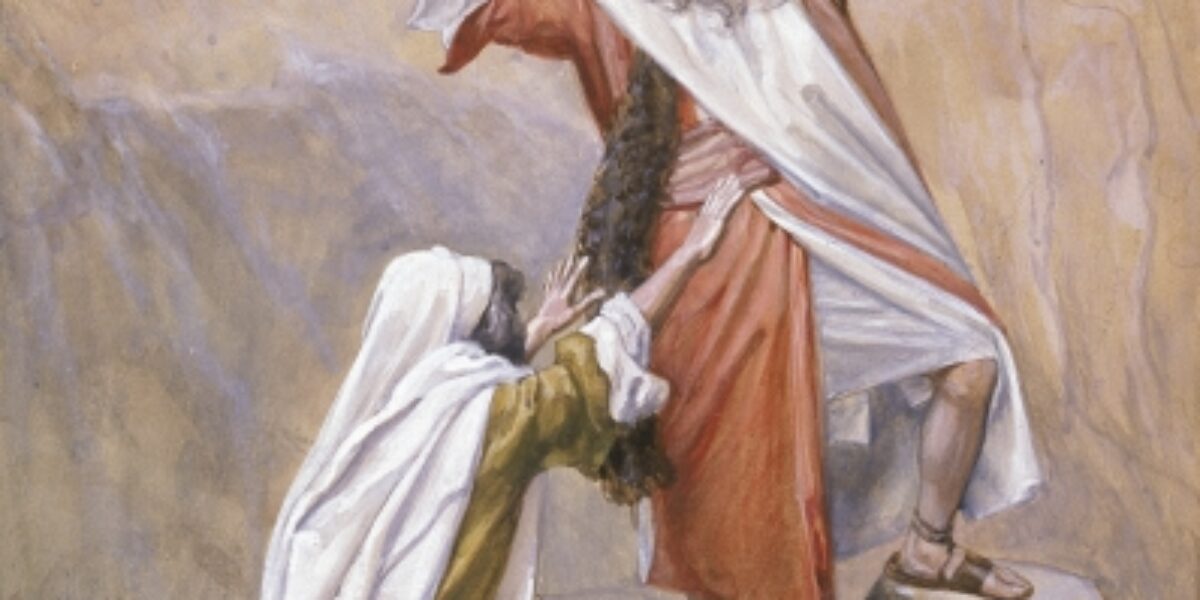Ki Tissa – Ex. 30:11-34:35 (March 13/14)

As the Torah Turns
Rabbi Lader’s Weekly D’var Torah
Ki Tissa – Ex. 30:11-34:35 (March 13/14)
Our Torah portion this week is Ki Tissa’ – Ex. 30:11-34:35, and includes an important scene in which Moses stands at Sinai humbly entreating God to forgive the Israelites – after the episode of the Golden Calf. Moses stands on the mountain, God’s Presence descends in a cloud and stands with him there; a voice proclaiming: “Adonai, Adonai, a God merciful and gracious, slow to anger, and abounding in steadfast love and faithfulness, keeping that love for multitudes, forgiving iniquity, transgression, and misdeed, but surely not cleansing them entirely, revisiting the sins of the fathers upon their children, and their children’s children, down to the third and fourth generation.” (34:7-8) These verses describe a God who is merciful and gracious and forgiving… but only up to a point. Not only are the parents guilty, but this guilt is then passed on to the second, the third, and to the fourth generations – who are all held accountable for, and feel the consequences of, transgressions that are not theirs. This might be a merciful God, but a God with a long memory. But… as time goes on, this idea of God seeking retribution from second, third, and fourth generations undergoes a transformation. During our Torah service, on festivals and definitely on the High Holy Days, “Adonai, Adonai” is included, but with a difference: “Adonai, Adonai, a God merciful and gracious, slow to anger, and abounding in steadfast love and faithfulness, keeping that love for multitudes, forgiving iniquity, transgression, and misdeed, and cleansing [us from our transgressions].” Period. No mention of not cleansing entirely of transgressions. No mention of revisiting the sins of the parents on their children and their children’s children and their children’s children’s children. This is important for two reasons. First, it is a progression of thinking about responsibility. Each generation… each person… is responsible for their own transgressions, and future generations are not punished for those transgressions of the past. (Of course, that does not mean that future generations do not feel the impact of transgressions made by past generations, but they are certainly not held responsible for them.) Second, and this is quite something: God is the One Who forgives and grants pardon with unmitigated compassion. Period. This is not a God of unending punishment, but a God of compassion; and this is a very hope-filled message. I would suggest that there is a third reason for the importance of this transformation, and that is the transformation itself. At some point in the early rabbinic community, someone chose to read these verses from Exodus and see a God Who is indeed compassionate, slow to anger, forgiving… a God Who sees each of us for who we are, now, in each present generation. Becoming aware of this transformation of thought is what excites me so much about studying Torah. The text is the text, with all its glory and its challenges. It is up to us to make meaning for our day and our time. In that way, it is truly a living Torah.
Tissa’ – Ex. 30:11-34:35, and includes an important scene in which Moses stands at Sinai humbly entreating God to forgive the Israelites – after the episode of the Golden Calf. Moses stands on the mountain, God’s Presence descends in a cloud and stands with him there; a voice proclaiming: “Adonai, Adonai, a God merciful and gracious, slow to anger, and abounding in steadfast love and faithfulness, keeping that love for multitudes, forgiving iniquity, transgression, and misdeed, but surely not cleansing them entirely, revisiting the sins of the fathers upon their children, and their children’s children, down to the third and fourth generation.” (34:7-8) These verses describe a God who is merciful and gracious and forgiving… but only up to a point. Not only are the parents guilty, but this guilt is then passed on to the second, the third, and to the fourth generations – who are all held accountable for, and feel the consequences of, transgressions that are not theirs. This might be a merciful God, but a God with a long memory. But… as time goes on, this idea of God seeking retribution from second, third, and fourth generations undergoes a transformation. During our Torah service, on festivals and definitely on the High Holy Days, “Adonai, Adonai” is included, but with a difference: “Adonai, Adonai, a God merciful and gracious, slow to anger, and abounding in steadfast love and faithfulness, keeping that love for multitudes, forgiving iniquity, transgression, and misdeed, and cleansing [us from our transgressions].” Period. No mention of not cleansing entirely of transgressions. No mention of revisiting the sins of the parents on their children and their children’s children and their children’s children’s children. This is important for two reasons. First, it is a progression of thinking about responsibility. Each generation… each person… is responsible for their own transgressions, and future generations are not punished for those transgressions of the past. (Of course, that does not mean that future generations do not feel the impact of transgressions made by past generations, but they are certainly not held responsible for them.) Second, and this is quite something: God is the One Who forgives and grants pardon with unmitigated compassion. Period. This is not a God of unending punishment, but a God of compassion; and this is a very hope-filled message. I would suggest that there is a third reason for the importance of this transformation, and that is the transformation itself. At some point in the early rabbinic community, someone chose to read these verses from Exodus and see a God Who is indeed compassionate, slow to anger, forgiving… a God Who sees each of us for who we are, now, in each present generation. Becoming aware of this transformation of thought is what excites me so much about studying Torah. The text is the text, with all its glory and its challenges. It is up to us to make meaning for our day and our time. In that way, it is truly a living Torah.
From Previous Weeks

Tetzaveh – Ex. 27:20-30:10 (March 6/7)
This week’s Torah portion is Tetzaveh – Ex. 27:20-30:10. It is a continuation of the instructions for the building of the Mishkan,…

Terumah – Ex. 25:1-27:19 (Feb. 28/29)
Artist, Caroline Rothstein, comments: “In Parshat Terumah, we find our crew of Israelites rocking out in the desert after liberating themselves…

Mishpatim – Ex. 21:1-24:18 (Feb 21/22)
As the Torah Turns Rabbi Lader’s Weekly D’var Torah Mishpatim – Ex. 21:1-24:18 (Feb 21/22) This week’s Torah portion is Mishpatim…

Yitro – Ex. 18:1-20:23 (Feb 14/15)
As the Torah Turns Rabbi Lader’s Weekly D’var Torah Yitro – Ex. 18:1-20:23 (Feb 14/15) Our Torah portion this week…

